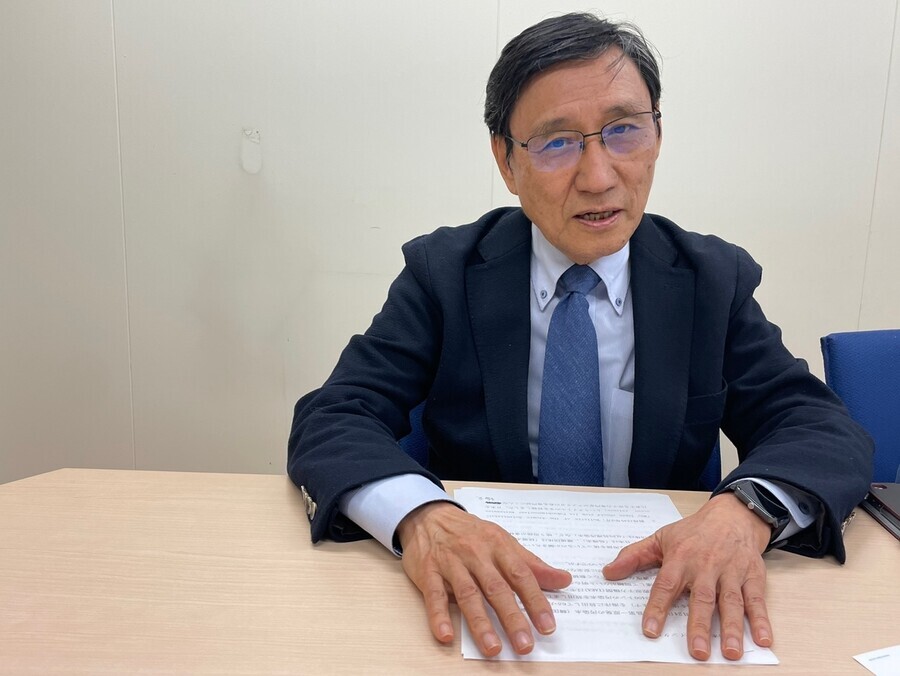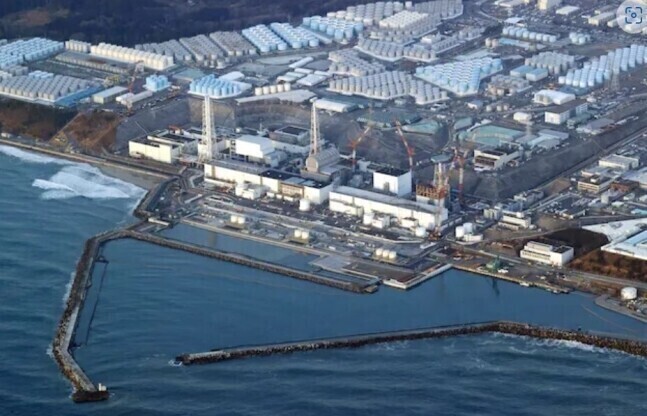
“The Japanese government needs to immediately cease dumping contaminated water into the ocean, and establish an independent oversight entity that can be trusted.”
As of Saturday, Feb. 24, Japan will have been dumping treated radioactive water from the Fukushima Daiichi nuclear power plant into the Pacific Ocean for six months. The company that operates the plant, Tokyo Electric Power Company (TEPCO), has dumped 23,400 metric tons of radioactive water into the ocean for the past six months, and is expected to do so for at least 30 years.
The Hankyoreh spoke with Tatsujiro Suzuki, 72, the vice director of the Research Center for Nuclear Weapons Abolition at Nagasaki University, on Feb. 14. Japan started releasing radioactive water into the Pacific on Aug. 24.
“It’s important to realize that this is more than just a scientific or technological matter,” Suzuki said.
“Without public trust in the process,” Suzuki explained, “it doesn’t matter how much data TEPCO throws at the people. The public just becomes more distrustful.”
“We’re taking water that’s come into contact with leaked nuclear fuel due to a meltdown, treating it with ALPS [Advanced Liquid Processing System, a process for removing radioactive material], and dumping it into the ocean. This is something that’s never been done before,” Suzuki said.
Suzuki is one of Japan’s premier experts on nuclear energy and technology. He served as the vice chairman of the Japan Atomic Energy Commission from 2010 to 2014. He also contributed to the clean-up process following the Fukushima disaster in 2011.
In September, Suzuki brought the problems behind the Fukushima release to the international public eye by submitting an opinion piece titled, “Why Japan should stop its Fukushima nuclear wastewater release,” to the Bulletin of the Atomic Scientists, a nonprofit organization.

Hankyoreh: As of Feb. 24, Japan will have been dumping nuclear wastewater from Fukushima for six months. Roughly 23,400 metric tons of contaminated water have been dumped into the Pacific. The Japanese government, TEPCO, and the International Atomic Energy Agency (IAEA) all claim that there are no safety issues.
Suzuki: First off, it’s important to note that the “ALPS-treated water” coming out of the Fukushima power plant is different from the wastewater that normally comes out of nuclear power plants. Fukushima’s wastewater has been treated so that, technically, the amount of radioactive nuclides, or radionuclides, falls below regulatory standards. However, it still contains radionuclides such as cesium, strontium, and iodine. In a nuclear power plant that functions normally, it’s rare to see water that has radionuclides other than tritium.
If the water from Fukushima is released into the ocean for the next 30 to 40 years, we don’t know how that will impact the ocean’s ecology and marine life. In an article published by National Geographic, Robert Richmond, the director of the Kewalo Marine Laboratory at the University of Hawaii, calls the Fukushima release a “trans-boundary and trans-generational event.”
In the same article, Ken Buesseler, a marine radiochemist and adviser to the Pacific Islands Forum, says he doesn’t think the releases will “irreparably destroy the Pacific Ocean,” but he warns that “it doesn’t mean we shouldn’t be concerned.” I’m not a marine radiochemist or oceanographer, so I can’t say for certain, but I generally agree with Richmond and Buesseler.
Hankyoreh: As Japan’s premier expert on nuclear energy, you surprised the world with your column in the Bulletin of the Atomic Scientists denouncing the Fukushima release. What prompted you to write it?
Suzuki: Six months after the start of the release, the debate and controversy surrounding Fukushima is still ongoing, both in and outside of Japan. The Japanese government is diluting water containing tritium, which ALPS can’t filter out, with seawater before releasing it into the Pacific. The government says this poses no safety issues, but there are a number of unanswered questions. Yasutoshi Nishimura, then the minister of economy, acknowledged before the national parliament that what we’re doing is unprecedented: Releasing water that’s been contaminated by radionuclides that got into the water through nuclear fuel that leaked due to an accident. Going beyond the Fukushima debate, I want to use this issue as an opportunity to reexamine how scientists can earn the public’s trust and to devise new solutions.
Hankyoreh: When it comes to the safety of radioactive water, the most important issue is trust. For example, South Korea and other nations have demanded samples of the treated water to independently evaluate the hazards it poses, but TEPCO refused to offer such samples.
Suzuki: Both the Japanese government and TEPCO need to realize that this issue goes beyond science and technology. You can’t dismiss someone who opposes the ocean release as simply somebody who doesn’t understand the science. American nuclear physicist Alvin Weinberg talked about “trans-science,” or questions that can be asked of science and yet cannot be answered by science. The Fukushima question is a matter of trans-science, because it involves questions that contemporary scientists cannot answer. The data is not everything. If TEPCO cannot earn the public’s trust regarding the process of the Fukushima release, then it can throw around all the data in the world, and it will only increase the public’s distrust. I don’t know why they declined to offer water samples, but it certainly clouded the transparency of the process.
Hankyoreh: There are also questions surrounding the effectiveness of the ALPS treatment methods.
Suzuki:In August 2018, Japanese media outlets reported that around 70% of the water stored in tanks at Fukushima contained higher-than-permitted levels of radionuclides like cesium, strontium, and iodine, which are extremely harmful to the body. I was genuinely shocked. TEPCO had persistently claimed that they had reduced the level of radionuclides, excluding tritium, through ALPS to satisfy regulatory standards. To reduce the potential danger of the treated water and to confirm the effectiveness of ALPS, it’s essential that we treat the water in those storage tanks a second time. The water is scheduled to be released into the Pacific for the next 30 to 40 years. The questions surrounding the effectiveness of ALPS are truly concerning.
Hankyoreh: What can be done to regain the public’s trust?
Suzuki: First off, the Japanese government needs to cease the ocean release and establish an independent oversight entity that can earn the trust of the concerned parties. This entity needs to oversee both the water’s treatment process and reviews that determine whether or not the Fukushima plant will be permanently decommissioned. One of the stated reasons for the release is to make space for the process of permanently decommissioning the reactor. Yet the authorities have not made an official decision on the reactor’s permanent decommissioning, nor has a specific timeframe been established, so that calls into question the timing of the release. Why does it have to be done now?
The decision-making process behind the water’s treatment is also questionable. Of all the possible options, it’s not clear why they chose an ocean release. They didn’t sit down and discuss the pros and cons of potential solutions, nor did they study the release’s potential effects on the local community and on neighboring countries. Not to mention there was no study done on the potential environmental impact. These are issues that the independent oversight entity needs to dive into. The entity needs to be held accountable by the national parliament, and should comprise experts from a wide spectrum of areas. The government needs to go beyond “scientific reason” when it comes to earning the public’s trust.
Hankyoreh: The Japanese government seems to be satisfied with placing faith in the IAEA.
Suzuki: The IAEA’s monitoring and internal reports certainly help, but they did not evaluate the release in the context of its continuing for the next 30 to 40 years. They simply evaluated a water sample provided by TEPCO under parameters dictated by the Japanese government. Regarding an IAEA report that declared that the “treated water would have a negligible radiological impact to people and the environment,” Rafael Grossi, director general of the IAEA, stressed that the report did not recommend or support the Japanese government’s policy in any way. The IAEA Safety Standards Series No. GSG-8, Radiation Protection of the Public and the Environment, states: “For planned exposure situations, justification is the process of determining whether a practice is, overall, beneficial, i.e. whether the expected benefits to individuals and to society from introducing or continuing the practice outweigh the harm (including radiation detriment) resulting from the practice.”
Yet neither the IAEA nor the Japanese government conducted a thorough evaluation of the potential harms and benefits of the release. That is why we need an independent entity.
By Kim So-youn, Tokyo correspondent
Please direct questions or comments to [[email protected]]

